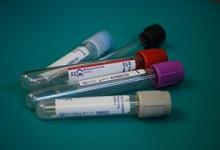Wine and the rheumatologist: reflections from EULAR (part 1) Save
I was at EULAR this year in Rome with my daughter Cassandra, who is new rheumatology fellow. We had a great time, working and playing hard in the eternal city. We went to the restaurant and enoteca Rochioli, one of the greatest places in this crazy and lovely city, and dined with several rheumatology oenophiles, including honorary rheumatologist Kevin Winthrop, who makes quality wine (but that’s a future blog).
[Image: Cassie and Len Calabrese, Rome 2015]
The list at Rochioli is incredible. It’s not that they have thousands of labels, it was more that the list was so thoughtful. I struck up a conversation with the waiter, who told me he came to work at Rochioli precisely because of their wine list! Imagine hearing this from a waiter anywhere. I then asked him his opinion on an iconic wine that I had researched from the region of Lazio (not known for iconic wines) that I had never had and shared with him my desire to try this as something representative of his ‘region’. He looked at me and said no. He then diplomatically, but emphatically told me I should drink another wine, which incidentally was half as expensive. Clearly he was my kind of guy, so we drank it and it was terrific. What the wine was is not important, for the message of this story is that wine is often more about passion than points or labels or how much you spend.
On another night we went to Il Sanlorenzo, which food blogger Katie Parla says is unequivocally the ‘finest sea food restaurant in Rome’. A tall order to fill and I will tell you we agree! Here again the list was passionate. Now, Il Sanlorenzo is an expensive restaurant, so I was cautious in my approach to their incredible list. I struck up a conversation with the sommelier and told him what I liked and what I own. I really liked him and I turned and told him to bring me something that will both suprise me and “make me happy” (see my previous blog for an explanation of that!). He went off to search and brought me a beautiful Roso from the vintner Palari located in the hills surrounding Mesina Sicily. This wine is a blend grape many of which are found on Mt Etna. I never had it before and it was beautiful. At the end of dinner I realized I never asked the price and was mindful that on their list were bottles costing many hundreds of Euros. I usually am not so trusting in fancy restaurants and so I braced myself for the “il conto”. To my wonderment, the wine he brought us was about 35 Euros - now that’s a professional sommelier!
Finally, when I returned home I sought out some similar Faro wines and have drunk a few of them. I clearly loved drinking them again but my anticipation was slightly diminished at home compared to drinking them in Rome. Each wine was very good but not exceptional. What was the reason for this? Different vintage, affected by shipping, or time - or was it me?
I think I know the answer pretty clearly, as well as do those of you who have had the same experience. You remember a wine with such fond memory almost always because of the overall experience of where and with whom you have drunk it. Some of you may analogize this to the placebo effect, and you may be right because we rheumatologists know that that placebos can be quite powerful.
Just a few weeks ago I heard an interview with a taste scientist at Cornell University, Robin Dando, who reported on a very cool experiment on taste published in the journal Appetite (I think I am going to volunteer to review for this one). They serially performed taste tests on the population attending home football games and asked them how they perceived tastes of ‘different ice creams’ from week to week. What the attendees did not know was that the samples were always the same. Not surprisingly, when the home team won they loved it and when they lost, well, not so much. Dr. Dando points out that taste buds have high concentrations of serotonin receptors and thus can be heavily influenced by mood!
So in closing, wine I believe is just like everything else in life in that we see the world (and the wine) the way we are primarily! When life is good, we can buffer the travails of our day to day lives. In our practice of rheumatology, when we are happy and mindful, we can handle a remarkable amount of stress and be resilient. On the other hand when we ourselves are stressed we don’t handle the daily hassles very well, we don’t use emotional intelligence very well and we are far from resilient. Wine is no different. I rarely drink by myself, and I think my reason for drinking with friends is summed up by Judith Viorst:
Close friends contribute to our personal growth. They also contribute to our personal pleasure, making the music sound sweeter, the wine taste richer, the laughter ring louder because they are there.
I am off to Siciliy this month with friends for a pre-ACR tune up. Stay tuned...and in the meantime, share your wine and rheumatology stories with me at calabrl@ccf.org or by commenting below. r










If you are a health practitioner, you may Login/Register to comment.
Due to the nature of these comment forums, only health practitioners are allowed to comment at this time.